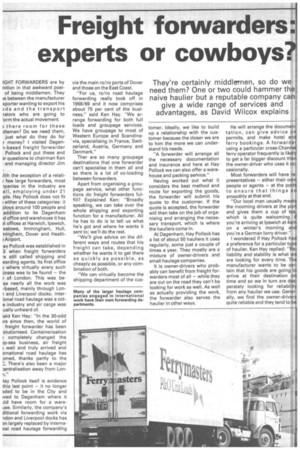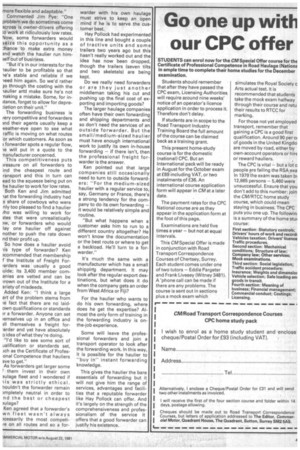Freight forwarders: experts or cowboys?
Page 34

Page 35

If you've noticed an error in this article please click here to report it so we can fix it.
They're certainly middlemen, so do we need them? One or two could hammer the naive haulier but a reputable company can give a wide range of services and advantages, as David Wilcox explains
IGHT FORWARDERS are by nition in that awkward posiof being middlemen. They le between the manufacturer xporter wanting to export his 3cls and the transport rators who are going to :orm the actual movement.
; there room for these dlemen? Do we need them, just what do they do for r money? I visited Dagen1-based freight forwarder Pollock and put these and 3 r questions to chairman Ken and managing director Jim /ith the exception of a relatir few large forwarders, most -ipanies in the industry are all, employing under 21
ple. Hay Pollock does not fit either of these categories: it ploys around 100 people and addition to its Dagenham
d office and warehouse it has 31 offices at Harwich, Ipswich, xstowe, Immingham, Hull, -ningham, Dover and Heathr Airport.
ay Pollock was established in 3 when freight forwarders -e still called shipping and warding agents. Its first office 3 where virtually every such imess was to be found — the r of London. This was bese nearly all the work was -based, mainly through Lon
and Liverpool docks; interlanai road haulage was a cot e industry and air carge was ually unheard of.
laid Ken Hay: "In the 30-odd irs since then, the world of freight forwarder has been olutionised. Containerisation ; completely changed the
p-sea business, air freight 3 well and truly arrived and rnational road haulage has Dmed, thanks partly to the 1 There's also been a major ..;entralisation away from Lon
lay Pollock itself is evidence this last point — it no longer adect to be in the City and ived to Dagenham where it ild have room for a wareJse. Similarly, the company's ditional forwarding work via iclon and Liverpool docks has ?.n largely replaced by internecal road haulage forwarding via the main ro/ro ports of Dover and those on the East Coast.
"For us, ro/ro road haulage forwarding really took off in 1968/69 and it now comprises about 75 per cent of the business," said Ken Hay. "We arrange forwarding for both full loads and groupage services. We have groupage to most of Western Europe and Scandinavia, specialising in France, Switzerland, Austria, Germany and Denmark."
Ther are so many groupage destinations that one forwarder can't specialise in them all and so there is a lot of co-loading between forwarders.
Apart from organising a groupage service, what other functions do freight forwarders fulfill? Explained Ken: "Broadly speaking, we can take over the whole shipping and exporting function for a manufacturer. All he has to do is to tell us what he's got and where he wants it sent to; we'll do the rest.
"We'll give advice on the different ways and routes that his freight can take, depending whether he wants it to get there as quickly as possible, as cheaply as possible, or any combination of both.
"We can virtually become the shipping department of the cus tomer. Ideally, we like to build up a relationship with the customer because the closer we are to him the more we can understand his needs.
"A forwarder will arrange all the necessary documentation and insurance and here at Hay Pollock we can also offer a warehouse and packing service."
Having worked out what it considers the best method and route for exporting the goods, the forwarder will submit his quote to the customer. If the quote is accepted, the forwarder will then take on the job of organising and arranging the necessary transport, which is where the hauliers come in.
At Dagenham, Hay Pollock has a list of about 50 hauliers it uses regularly, some just a couple of times a year. They mostly are a mixture of owner-drivers and small haulage companies.
It is owner-drivers who probably can benefit from freight forwarders most of all — while they are out on the road they can't be looking for work as well. As well as actually providing the work, the forwarder also serves the haulier in other ways. He will arrange the documentation, can give advice on permits, and make hotel and ferry bookings. A forwarder using a particular cross-Channel ferry operator frequently is likely to get a far bigger discount than the owner-driver who uses it occasionally.
Most forwarders will have representatives — either their own people or agents — at the ports to ensure that things so smoothly at that end.
"Our local man usually meets the incoming drivers at the port and gives them a cup of tea, which is quite welcoming if you're arriving at Ipswich at 4am on a winter's morning and you're a German lorry driver."
I wondered if Hay Pollock had a preference for a particular type of haulier. Ken Hay replied: "Reliability and stability is what we are looking for every time. The manufacturer wants to be certain that his goods are going to arrive at their destination on time and so we in turn are desperately looking for reliability from any haulier we use. Generally, we find the owner-drivers quite reliable and they tend to be more flexible and adaptable." Commented Jim Rye: "One problem we do sometimes come across is owner-drivers offering to work at ridiculously low rates. Now, some forwarders would seize this opportunity as a hance to make extra money and watch the haulier run himself out of business.
"But it's in our interests for the laulier to be profitable so that le's stable and reliable if we leed him again. So we'd rather jo through the costing with the iaulier and make sure he's not naking a mistake. Some, for initance, forget to allow for depre:iation on their unit."
The forwarding business is rery competitive and forwarders ind their agents usually keep a weather-eye open to see what raffic is moving on what routes or which customers. As soon as ) forwarder spots a regular flow, 3e will put in a quote to the nanufacturer concerned.
This competitiveness puts iressure on all forwarders to ind the cheapest route and ransport and this in turn can ead to the squeeze being put on he haulier to work for low rates. Both Ken and Jim admitted let the forwarding industry had s share of cowboys who were nly too pleased to find a haulier rho was willing to work for 3tes that were unrealistically nv, or forwarders who would lay one haulier off against nother to push the rate down nd their profit up.
So how does a haulier avoid is type of forwarder? Ken .3commended that membership f the Institute of Freight Forfarders was usually a good uide; its 3,400 member comanies are vetted and can be irown out of the Institute for a ariety of misdeeds.
Added Ken: "I think a large art of the problem stems from la fact that there are no laidown qualifications or standards )1a forwarder. Anyone can set iemselves up in an office and ll themselves a freight for:arder and yet have absolutely idea of what they're doing. "I'd like to see some sort of Jalification or standards set, J c h as the Certificate of Profesonal Competence that hauliers ave to get."
As forwarders get larger some F them invest in their own aulage fleet and I wondered if is was strictly ethical. houldn't the forwarder remain mpletely neutral in order to nd the best or cheapest iulage?
Ken agreed that a forwarder's wn fleet wasn't always icessarily the most competire on all routes and so a for warder with his own haulage must strive to keep an open mind if he is to serve the customer best.
Hay Pollock had experimented in this line and bought a couple of tractive units and some trailers two years ago but this hasn't really worked out and the idea has now been dropped, though the trailers (seven tilts and two skeletals) are being kept.
Do we really need forwarders or are they just another middleman taking his cut and pushing up the final cost of exporting and importing goods?
The larger haulage companies often have their own forwarding and shipping departments and so don't need the services of an outside forwarder. But the small/medium-sized haulier must have enough international work to justify its own in-house forwarding — if there isn't, then the professional freight forwarder is the answer.
Ken pointed out that large companies still occasionally need to turn to outside forwarders: "For the medium-sized haulier with a regular service to, say, Germany or France, there's a strong tendency for the company to do its own forwarding — it would be relatively simple and routine.
"But what happens when a customer asks him to run to a different country altogether? He won't know the documentation or the best route or where to get a backload. He'll turn to a forwarder."
It's much the same with a manufacturer which has a small shippirrg department. It may look after the regular export destinations, but what does it do when the company gets an order from West Africa or Fiji?
For the haulier who wants to do his own forwarding, where does he get the expertise? Almost the only form of training in the forwarding industry is onthe-job experience.
Some will leave the professional forwarders and join a transport operator to look after the forwarding work. In this way, it is possible for the haulier to "buy in" instant forwarding knowledge.
This gives the haulier the bare essentials of forwarding but it will not give him the range of services, advantages and facilities that a reputable forwarder like Hay Pollock can offer. And it's largely on the strength of the comprehensiveness and professionalism of the service it offers that a good forwarder can justify his existence.




























































